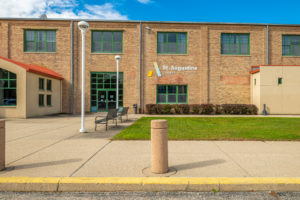Is Respiratory Therapy School Hard?
January 11, 2024
Embracing the Challenge: Succeding in Respiratory Therapist School at St. Augustine
Pursuing a medical education is widely acknowledged as one of the most challenging educational paths. At St. Augustine College, we recognize these challenges and have tailored our Associate of Applied Science Degree in Respiratory Therapy to empower our students to excel in this demanding field.
Is Respiratory Therapy School Hard?
While the path to becoming a respiratory therapist is challenging and everyone will handle the courseload differently, we ensure you’re not having to do it alone! Our program is designed to support you every step of the way, from mastering complex skills to preparing for your career post-graduation.
The Reality of Respiratory Therapist School
The journey to becoming a respiratory therapist is rigorous. The comprehensive curriculum covers a range of required critical skills including:
- Pulmonary function testing
- Arterial blood gas analysis
- Medical gas administration
- Humidity and aerosol therapy
- Airway management
- Cardiopulmonary resuscitation
- Ventilatory support of neonatal/pediatric and adult populations
These areas require dedication and hard work which is reflective of the crucial role respiratory therapists play in healthcare.
Debunking Common Myths About Respiratory Therapist School
As you consider a career in respiratory therapy, you might hear various myths about the education involved. At St. Augustine College, we provide clear and accurate information to help you make informed decisions. Let’s debunk some common myths about respiratory therapist school.
Myth 1: Respiratory Therapist School Is Too Difficult for Most People to Succeed
While the coursework in respiratory therapy is challenging, it’s designed to be achievable. Our program at St. Augustine offers a supportive environment, with resources like personalized tutoring and mentoring, ensuring that dedicated students can and do succeed in their respiratory therapist classes.
Myth 2: Online Classes Make RT School Harder
Our program requires a significant portion of in-person training (60-70%). This hands-on experience is crucial for developing real-world skills and cannot be replicated online. However, our flexible scheduling and bilingual options accommodate different learning styles and needs.
Myth 3: Respiratory Therapist School Is Only About Learning Medical Procedures
Respiratory therapist school is comprehensive. It includes not only medical procedures but also developing cognitive and affective skills like critical thinking and professional ethics. This holistic approach is vital for shaping well-rounded healthcare professionals.
Myth 4: Once You Graduate From RT School, You’re on Your Own
At St. Augustine College, our support extends beyond graduation. We assist with job placement, exam preparation, and offer guidance on further educational pathways, ensuring our graduates are well-prepared for their careers in respiratory therapy.
Myth 5: Respiratory Therapist School Doesn’t Offer Real-World Experience
Our respiratory therapist classes are designed to provide extensive real-world experience. From clinical rotations in diverse healthcare settings to hands-on training in state-of-the-art labs, we ensure that our students are well-prepared for the challenges they will face in their professional lives.
Begin Your Journey in Respiratory Therapy with Confidence
Are you ready to embrace the rewarding challenge of becoming a respiratory therapist? Join our Associate of Applied Science Degree in Respiratory Therapy at St. Augustine College. Here, we not only equip you with the necessary knowledge and skills but also provide an unwavering support system to guide you toward success in this dynamic field. Discover more about our comprehensive respiratory therapist classes and seize the opportunity to transform your passion into a fulfilling career. Apply today and start your journey towards becoming a key part of the healthcare community with St. Augustine College.





